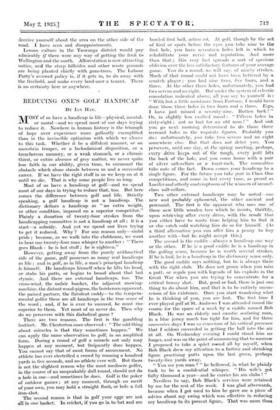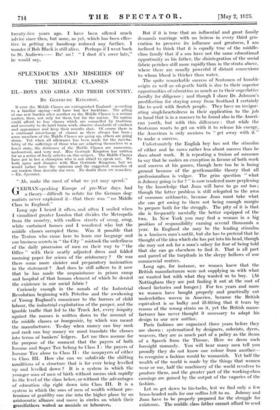REDUCING ONE'S GOLF HANDICAP
BY IAN HAY.
MOST of us have a. handicap in life—physical, mental, or moral—and we spend most of our days trying to reduce it. Nowhere in human history is the triumph of hope over experience more gallantly exemplified than in the invincible optimism with which we cleave to this task. Whether it be a diffident manner, or an uncertain temper, or a lackadaisical disposition, or a treacherous memory, or a weak stomach, or a chronic thirst, or entire absence of grey matter, we never quite lose faith in our ability, given time, to surmount the obstacle which alone stands between us and a successful career. If we have.the right stuff in us we keep on at it until we die. That is why some people live so long.
Most of us have a handicap at golf—and we spend most of our days in trying to reduce that, too. But here comes the difference between golf and life. Strictly speaking, a golf handicap is not a handicap. The dictionary defines a handicap as " an extra weight, or other condition, imposed on a superior competitor." Plainly a donation of twenty-four strokes from the handicapping committee is not a handicap at all ; it is a start—a subsidy. And yet we spend our lives trying to get it reduced. Why ? For one reason only—sinful pride ; because, as we walk into the clubhouse, we want to hear one twenty-four man whisper to another : " There goes Blank : he is hot stuff ; he is eighteen."
However, getting away from the purely arithmetical side of the game, golf possesses as many real handicaps as life ; and in golf, as in life, a man's principal handicap is himself. He handicaps himself .when he lifts his head, or stabs his putts, or begins to brood about that last stymie. And there are external handicaps, too. The cross-wind, the unfair bunker, the adjacent mowing- machine, the distant wood-pigeon, the boisterous opponent, the pained partner, the flatulent caddy—to the tempera- mental golfer these are all handicaps in the true sense of the word ; and, if he is ever to succeed, he must rise superior to them. Yet most of us never do. Then why do we persevere with this diabolical game ?
There are two reasons. The first is the gambling instinct. Mr. Chesterton once observed : " The odd thing about miracles is that they sometimes happen." We can apply the same observation to golf, in an amplified form. During a round of golf a miracle not only may happen at any moment, but frequently does happen.
You cannot say that of most forms of amusement. No athlete has ever electrified a crowd by running a hundred yards M five seconds, and no athlete ever will. But there is not the slightest reason why the most mediocre golfer, in the course of an unspeakably dull round, should not do a hole in one—and sometimes he does. Golf is the poker of outdoor games ; at any moment, through no merit of your own, you may hold a straight flush, or hole a full iron-shot.
The second reason is that in golf your eggs are not all'in rine baiket. In cricketif you go in to bat and are bowled first ball, aeium est. At golf, though by the act of God or spots before the eyes you take nine to the first hole, you have seventeen holes left in which to rehabilitate your nerve and reputation. And more than that ; this very fact spreads a sort of specious oblivion over the less satisfactory features of your average game. You do a round, we will say, of ninety strokes.
Much of that round could not have been bettered by a scratch player ; you had nine fives, five fours, and a three. At the other three holes, unfortunately, you had two sevens and an eight. But under the system of eclectic consolation indicated above, all you say to yourself is " With but a little assistance from Fortune, I would have done those three holes in two fours and a three. - Ergo, I have just missed a seventy-nine. Rotten luck ! " Or, in slightly less exalted mood : " Fifteen holes in sixty-eight ; not so bad for an old man ! " And out you go next morning determined to. do those three recreant holes in the requisite figures. Probably you do ; unfortunately, you take two sevens and an eight somewhere else. But that does not deter you. You persevere, until one day, at the spring meeting, perhaps, every drive keeps out of the rough, every putt hits the back of the hole, and you conic home with a pair of silver salt-cellars or a toast-rack. The committee take note of the fact. Down comes your handicap to a single figure. For the future you take part in Class One competitions, and come in last every time, as proud as Lucifer and utterly contemptuous of the winners of second- class salt-cellars.
Two other external handicaps may be noted—one new and probably ephemeral, the other ancient and perennial. The first is the opponent who uses one of those new little wooden tees which he insists, thriftily, upon retrieving after every drive, with the result that you either have to waste time helping him to find it or else catch cold watching him do so for himself. (As a third alternative you can offer him a penny to buy another with—but he might accept this.) The second is the caddie—always a handicap one way or the other. If he is a good caddie he is a handicap in the golfing sense, because he is worth several strokes. If he is bad, he is a handicap in the dictionary sense only.
The good caddie says nothing, but he is always there with the right club. He does not groan when you miss a putt, or regale you with legends of his exploits in the Great War when you are trying to concentrate for a critical brassy shot. But, good or bad, there is just one thing to do about him, and that is to be entirely uncon- scious of his existence. Once you start wondering what he is thinking of you, you are lost. The first time I ever played golf at St. Andrews I was attended round the course for the space of a week by a caddie named Bob Black. He was an elderly and caustic seafaring man, in a blue jersey much too tight for him, and for three successive days I was so conscious of his critical presence that I seldom succeeded in getting the ball into the air at all. On Wednesday evening I could stand him no longer, and was on the point of announcing that to-morrow I proposed to take a qthet round all by myself, when Bob Black drew my attention to a furtive and shrinking figure practising putts upon the last green, perhaps twenty-five yards away.
" You see yon man ? " he bellowed, in what he plainly took to be a confidential whisper. " His wife's got fufty thousand a year—and he carries his ain clubs ! "
Needless to say, Bob Black's services were retained by me for the rest of the week. I was glad afterwards, because when I got used to him he gaVe me a piece of advice about my swing which was effective in reducing my handicap to its present figure. That was more than twenty-five years ago. I have been offered much advice since then, but none, as yet, which has been effec- tive in getting my handicap reduced any further. I wonder if Bob Black is still alive. Perhaps if I went back to St. Andrews— But no ! " I doot it's over late," he would say.











































 Previous page
Previous page